FAIR = Fairness & Accuracy in Reporting
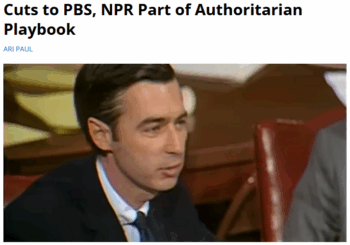
Ari Paul (FAIR.org, 4/25/25): “Going after public broadcasters is…part of the neo-fascist playbook authoritarian leaders around the world are using to clamp down on dissent and keep the public in the dark.”
The death of former 1960s radical turned right-wing provocateur David Horowitz brought to mind the time he called me “stupid” (Michigan Daily, 9/8/03) because he disliked a column (Michigan Daily, 9/2/03) I wrote about neoconservatism.
I was reminded of that again just days later when Matt Taibbi (Racket News, 5/4/25), a journalist who left Occupy Wall Street populism for ruling class sycophancy, attacked my recent article, “Cuts to PBS, NPR Part of Authoritarian Playbook” (FAIR.org, 4/25/25). In his response, titled, “No, State Media and Democracy Don’t Go ‘Hand in Hand.’ Just the Opposite,” Taibbi asked, “How nuts do you have to be to think ‘strong state media’ doesn’t have a dark side?”
It’s a straw man argument, with a heavy dose of McCarthyism thrown in to boot. I’d encourage everyone to read both pieces in full, but here I’ll break down the main problems with Taibbi’s piece.
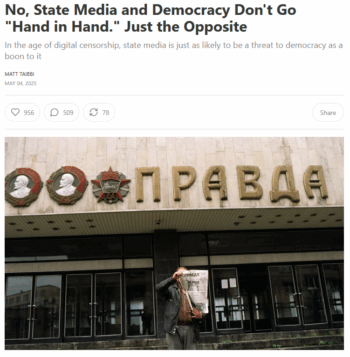
Matt Taibbi (Racket News, 5/4/25): “The above is either satire or written by someone consciously ignoring the history of state media.”
Taibbi’s main trick is to pretend that “state media” and “public media” are interchangeable. They’re not. State media consists of government propaganda outlets that answer directly to executive authority, rather than independent editors. Public media are independent outlets that receive taxpayer subsidies. As I wrote in my piece, NPR “only gets 1% of its funding directly from the CPB,” the Corporation for Public Broadcasting.
Obviously, if NPR and PBS were “state media,” Trump wouldn’t need to try to shut them down; he would already control them editorially. That’s not to say that they’re perfectly independent. FAIR writers, including myself (11/26/20), have for decades been critical of NPR and PBS political coverage. FAIR (e.g., 6/1/99, 9/17/04, 5/11/24, 10/24/24) has pointed out again and again that right-wing complaints about supposed left-wing bias in public broadcasting have repeatedly resulted in compromised coverage. (I noted in the very piece Taibbi purports to critique that Republican critics of public broadcasting “use their leverage over CPB funding to push NPR and PBS political programming to the right.”)
FAIR’s Julie Hollar (FAIR.org, 5/2/25) wrote just days before Taibbi’s post that NPR had downplayed the Trump administration’s attack on free speech, taking a false “both sides” approach to the issue. So, yes, FAIR is outspoken about the “dark side” of NPR and PBS, and Taibbi surely knows it. But he doesn’t seem interested in an honest argument.
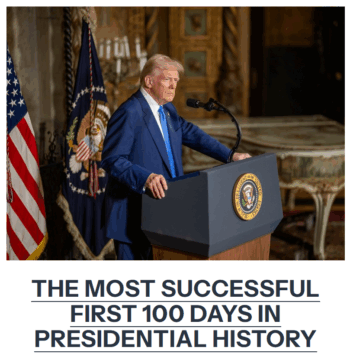
White House Wire (4/30/25) is already the kind of state media Taibbi warns PBS could turn into.
Taibbi used quotation marks around “strong state media” twice, when those aren’t the words I used—they’re his. He claimed that I was “consciously ignoring the history of state media,” though much of my piece concerned state efforts to force conformity on public outlets. While failing to engage with the rest of my article, he took the reader to Russia in the 1990s, when independent journalists (like himself) were working:
That period, like the lives of many of those folks, didn’t last long. Vladimir Putin sent masked police into the last independent TV station on May 11, 2000, capping less than ten years of quasi-free speech. “Strong state media” remained, but actual journalism vanished.
I’m very open about my opposition to the tyranny of autocrats shutting down and raiding journalistic institutions (FAIR.org, 5/19/21, 6/8/23, 8/14/23, 10/22/24). And my article noted that other wannabe autocrats are attacking public broadcasters, notably in Italy, Israel and Argentina, a fact that does not undermine but rather supports the idea that there’s a correlation between public broadcasting and democracy.
If Taibbi were truly worried about “state media,” he wouldn’t be mad at a meager government subsidy to NPR or PBS, but instead would show more concern for something like the Trump administration’s White House Wire, “a news-style website that publishes exclusively positive coverage of the president on official White House servers” (Guardian, 5/1/25). And mentioning Putin’s attacks on “independent TV” is certainly a better argument against Trump’s FCC investigations into private US outlets like ABC and CBS than it is against the existence of NPR or PBS.
Taibbi’s invocation of “Putin” and “Russia” as a reason why we should not be concerned about Trump’s attacks on public broadcasting is such an illogical non sequitur, it makes more sense to interpret it as standard-issue McCarthyism. This is bolstered by Taibbi’s invocation of more paranoia about any state subsidy for media:
Yes, Car Talk and the MacNeil/Lehrer Report were cool, but outlets like Neues Deutschland, Télé Zaïre and Tung Padewat more often went “hand in hand” with fingernail factories or firing squads than democracy.
He seemed to be trying to scare the reader into thinking that we are just one episode of Wait, Wait…Don’t Tell Me! away from the Cambodian genocide.
The neo–Cold War trick is to just say “Putin” enough times in hopes that the reader will eventually realize that the US government funding anything is a sign of impending tyranny. It’s an old joke to accuse greying reactionaries of hating publicly funded snowplows because “that’s socialism,” but that appears to be where Taibbi is these days.

Timothy Neff and Victor Pickard (International Journal of Press/Politics, 7/24): “High levels of secure funding for public media systems and strong structural protections for the political and economic independence of those systems are consistently and positively correlated with healthy democracies.”
Taibbi pretended to refute my claim that “strong public media systems and open democracy go hand in hand,” but in his article’s large block quotation, he omitted two embedded citations to scholarly studies that support this assertion. One of those was from Political Quarterly (3/28/24), the other was an Annenberg School study (3/16/22) whose co-author, Annenberg’s Victor Pickard, has also written about the importance of public media for The Nation (4/15/25).
Taibbi could have challenged those studies if he wanted, and good-faith disagreement is welcome. Omitting them from the quotation, though, leaves out the critical part of my statement.
Taibbi continued:
People who grew up reading the BBC or AFP may imagine a correlation between a state media and democracy, but a more dependable indicator of a free society is whether or not obnoxious private journalism (like the Russian Top Secret, whose editor Artyom Borovik died in a mysterious plane crash) is allowed to proliferate.
I’ve written at length about that dangers that the Trump administration poses when it comes to censorship, intimidating journalists, lawfare against media and using the power of the state to chill speech (FAIR.org, 12/16/24, 1/23/25, 2/18/25, 2/26/25, 3/28/25, 4/29/25). Taibbi ignored this part of my record, which is referenced in part in the very article to which he’s responding. This is crucial, because my defense of PBS and NPR in this instance is part of a general belief that the government should not attack media organizations, public or private.
As someone who read Taibbi enthusiastically when he was a Rolling Stone and New York Press writer, it’s sad to see someone I once admired so sloppily attack FAIR’s defense of press freedom against anti-democratic state power. But on the bright side, his outburst acts as an inspiration for a place like FAIR to continue defending free speech and a free press, while mercilessly calling out state propagandists who disguise themselves as journalists.
Green Card–holding students are being abducted from the streets by agents of the state for attending protests and writing op-eds. News outlets are being investigated by the FCC for reporting that displeases the president. Federal web pages are being scrubbed of a lengthy list of words, including “race,” “transgender,” “women” and “climate.”
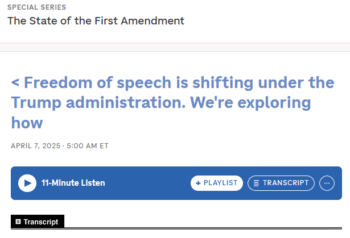
“Is President Trump a protector of the First Amendment, or is he the biggest threat to it since the McCarthy Era?” NPR (Morning Edition, 4/7/25) asked—with the argument for the former position being that “conservatives are just, in general, much more willing to speak their mind.”
NPR responded to this shocking government attack on free speech with a Morning Edition series on “The State of the First Amendment,” whose introductory episode’s headline (4/7/25) declared freedom of speech to be “shifting under the Trump administration”; it promised that the show would be “exploring how.”
The wishy-washy language wasn’t a promising start, and the segment only went downhill from there, taking an “on the one hand/on the other hand” framing to an assault on core democratic rights.
Host Leila Fadel explained: “All this week, we are going to look at the state of free speech in the United States. Who feels more free to speak? Who feels silenced?” After offering soundbites from people on “both sides” of this debate, she asked:
Is President Trump a protector of the First Amendment, or is he the biggest threat to it since the McCarthy era in the 1940s and ’50s, when fearmongering around Soviet and Communist influence led to the political persecution of academics and leftists?
It’s a vital question with a very clear and obvious answer—one that NPR, facing an investigation from the FCC into its corporate funding and a drive by Trump to end its federal funding, and laboring under ideological overseers installed by the Corporation for Public Broadcasting (FAIR.org, 10/24/24), refused to offer its listeners. (Trump signed a new executive order last night to attempt to defund NPR and PBS, accusing them of “radical, woke propaganda disguised as ‘news.'”)
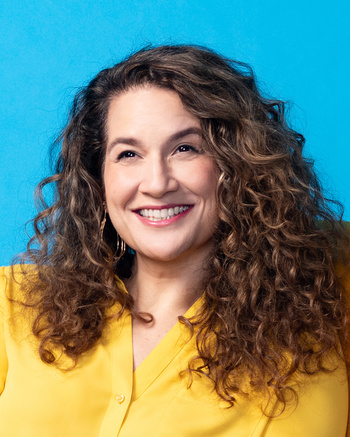
NPR‘s Leila Fadel (4/7/25): “Are free speech protections broadening right now under President Trump, or is censorship shifting?” (Photo: Mike Morgan/NPR)
After airing Trump’s claims to have “stopped all government censorship and brought back free speech in America,” Fadel offered brief descriptions of “attacks on the press” and actions that have “broken other norms as well, often in legally questionable ways.” (The first example: “Universities face uncertain futures as they become targets of the Trump administration.”)
The episode then took its balanced framing to an interview segment featuring two legal scholars, Lee Bollinger, former Columbia University president, and Jonathan Turley, a Fox News regular. Fadel introduced the two by noting that “they see the threats to [the First Amendment] in this moment differently. Bollinger sees danger under Trump,” while “Turley says he thinks this president could be an unexpected advocate.”
In her questioning of Turley, Fadel did rebut his claim that the Biden administration and social media companies colluded to censor conservative speech. She then brought up “actions by this administration that seem to be chilling speech,” citing “college professors warning students not to discuss or post opinions about Israel’s war in Gaza or Russia’s war in Ukraine for fear of deportation or arrest.” She noted as well that “government websites have taken down thousands of pages featuring information on vaccines, hate crimes, diversity.” She asked: “Are free speech protections broadening right now under President Trump, or is censorship shifting?”
It’s perhaps meant to be a tough question to make him admit that calling Trump a protector of free speech would be laughable if it weren’t so dangerous. (Turley responds, “Well, it’s too early to tell whether the Trump administration will make free speech truly part of its legacy in the second term.”) But Fadel’s language—”is censorship shifting?”—turns around and concedes the right’s false claims of censorship under the Biden administration (which she’d just rebutted!). Fadel and NPR offer only two ways of looking at the situation: Trump is increasing free speech, or censorship is just a swinging pendulum whose victims change as administrations change.
The segment wraps up with Bollinger and Turley finding at least one point of agreement: that the arrest and attempted deportation of Columbia University student Mahmoud Khalil violates, in Turley’s words, “part of the core protections that define us as a people.”
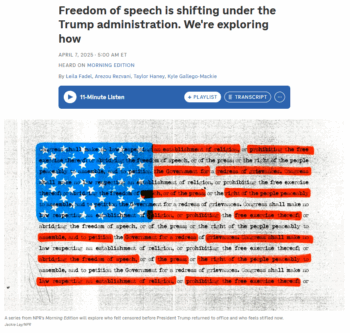
NPR (4/7/25) framed the First Amendment question as “who felt censored before President Trump returned to office and who feels stifled now.”
The online version of the show (4/7/25), in which the audio transcript is condensed into an article format, bent even further backwards to find balance. It explained that the series “will explore who felt censored before President Trump returned to office and who feels stifled now.”
That exploration started by naming real censorship that has already taken place: “scrubbing reports and federal grant applications of words the Trump administration has banned,” fears that “participating in protests could lead to deportation,” an online portal where people can “file complaints about diversity, equity and inclusion lessons in class with the US Department of Education.”
If this were a report on a foreign country, it’s hard to imagine NPR offering an “on the other hand” to that list of clearly authoritarian crackdowns on speech. But here comes the next paragraph, trotting out the obligatory balance:
Yet plenty of others—including anti-abortion activists, the far-right activist group Moms for Liberty and members of university Republican clubs—say they feel more free today to express views without fear of a backlash now that President Trump is back in office.
The article eliminates references to Turley and Bollinger, but includes two quotes. One is from a history teacher who feels afraid to answer student questions related to the Trump administration. That’s “balanced” by one from the president of the College Republicans at the University of California, Berkeley, who says they have more members willing to “be outwardly and openly conservative than we did before the election.”
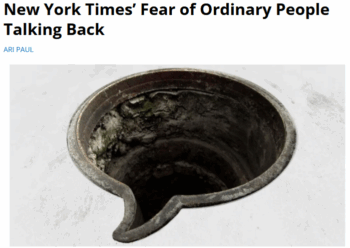
When you define the threat to free speech, as the New York Times (3/18/22) does, as “being shamed or shunned”—that is, criticized by others’ speech—it opens the door to suppressing speech in the name of free speech.
This absurd and harmful false balance NPR creates is predicated on the idea that “free speech” can mean simply how unconstrained a person feels to speak what might be unpopular opinions, including the various forms of bigotry and disinformation that have been unleashed by the Trump administration. But free speech is not, in fact, about feelings; it’s about consequences. It’s one thing to feel less afraid that your peers will criticize or even yell at you for speaking your opinions on campus. It’s another to fear that expressing your opinions will bring down official sanction, up to and including banishment from the country.
Free speech is not the freedom from “backlash” from those who disagree with your views, despite the MAGA movement’s best efforts to convince people of that—aided and abetted by many “liberal” elites and pundits who feel they have been “canceled” by left-wing criticism of their own (often bigoted) views. If college Republicans, anti-abortion activists or the Moms for Liberty feel constrained by peers harshly criticizing them or not inviting them to speak at public events, that’s not censorship; that’s ideas being contested in the public arena. Their right-wing perspectives still have many, many places to be heard, including the huge right-wing media ecosystem.
NPR concluded its article, “[Trump’s] critics say his concern for free speech is only for speech his administration finds acceptable.” That is, in fact, the only way you can make sense of the claim that Trump stands for “free speech”—by defining it as the ability of the approved people to speak, while those who would criticize (and thereby “cancel”) them are silenced (FAIR.org, 3/4/25).
The Trump administration is bringing the power of the state down on people who express opinions and ideas it finds objectionable. The consequences of that power, for both individuals and democracy, are quite dire. When NPR talks about “who feels more free to speak” and “who feels silenced,” it’s defining free speech the way MAGA wants it to be defined—as a vibe, not as a right. Ultimately, though, NPR‘s complicity in this Orwellian redefinition will not protect them from Trump’s vendetta.
ACTION ALERT: You can send a message to NPR public editor Kelly McBride here, or via Bluesky: @kellymcb.bsky.social. Please remember that respectful communication is the most effective. Feel free to leave a copy of your message in the comments thread of this post.
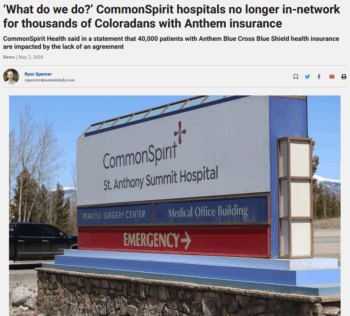
The Summit (Colo.) Daily (5/2/24) amplified the anxiety health consumers felt in the face of providers’ and insurers’ threats.
This time last year, tens of thousands of people in Colorado anxiously wondered if they’d have to find a new doctor or start using a different hospital. Contracts setting payment levels for Catholic Church–affiliated hospital chain CommonSpirit Health to be a member of preferred provider networks run by insurer Anthem Blue Cross Blue Shield of Colorado were set to expire on May 1, 2024, and negotiations were a train wreck.
CommonSpirit accused Anthem of trying to pay rates so low that its hospitals couldn’t afford to take care of patients, while Anthem shot back that CommonSpirit wanted rate increases at more than twice the rate of inflation (CBS KKTV 11, 4/30/24).
Media coverage reached a fever pitch as the deadline approached. Without a new agreement, Coloradans covered by Anthem insurance plans would have to pay far more out of pocket to use CommonSpirit hospitals and the system’s affiliated doctors (Denver Post, 4/26/24). The potential consequences would be extreme in communities where CommonSpirit is a dominant provider, especially in the state’s rural and resort areas, where the company’s facilities are the only available option for miles around (KOAA, 5/1/24). “What Do We Do?” a plaintive Summit Daily headline (5/2/24) asked.
The high-stakes negotiations dragged on for more than two weeks past the contract’s expiration, with the two corporate giants contending that the other side wanted dangerously low or unaffordably high rates.
The eventual settlement was greeted with a mixture of relief and anger from patients whose care had been disrupted. La Plata County resident Christie Hunter, whose son Ollie suffers from myasthenia gravis, an autoimmune disorder that weakens voluntary muscles, told the Durango Herald (5/17/24, 5/1/24) she was glad the two healthcare titans had settled, but angry that the dispute disrupted her family’s healthcare. The time spent looking for new providers “would have been much better spent trying to help my son, and get him feeling well enough to go to school.” Ollie’s first day at school after months of treatment and preparation was the day the Hunters received initial notice that they could lose access to his specialists.
Although the high-stakes conflict was about money, the terms of the new five-year price deal remain secret.
This kind of performative patient hostage-taking has become standard practice in hospital rate negotiations across the US. At least four major network contracts in Ohio/Virginia, Connecticut, Texas and Missouri expired at the beginning of April alone.
Media coverage usually captures the anxiety that patients like the Hunters experience at the disruption of critical medical relationships. Otherwise, the quality and depth of coverage varies widely. Some reporting fuels public hysteria to the benefit of the parties, while the best coverage provides critical national context and alerts audiences what to expect.
To help FAIR readers understand what’s happening when these conflicts hit their communities, we’ve assembled a few lessons from the past few years, and principles that should frame local and regional media coverage.
These stories are best understood as economic warfare between gangsters dividing money already looted from the public. Insurers, who offer employers and patients nothing the government can’t do better and cheaper, fight with hospital corporations who wield monopoly power to negotiate the world’s highest prices for inpatient care, leaving millions of Americans saddled with unmanageable medical debt.
Communicating with the public and political leaders through the media is a key negotiating strategy for both hospitals and insurance companies. Each side accuses the other of threatening patients’ access to doctors and hospitals. The corporations issue a deluge of press releases, statements and FAQ webpages to inform patients of pending changes to coverage, and the consequences for their financial, physical and mental health—all seasoned with a heavy dose of spin. The goal is to ratchet up public anxiety as the deadline approaches, and attach blame to the other side to win concessions.
Negotiations receive intense local and regional media coverage, following the same script. Both sides publicize the looming deadline, and warn that patients may lose access to local hospitals and valued doctors. Insurers accuse hospitals of price-gouging, while hospitals insist that insurers want to pay them less than it costs to take care of patients.
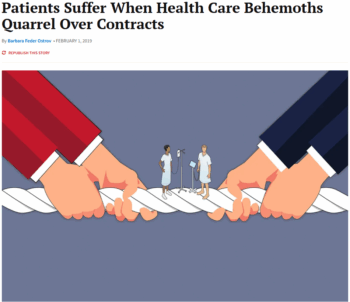
KFF Health News (2/1/19) accurately characterized the antagonists in the rate disputes as “behemoths.”
Outlets frequently catch on to the fact that they’re witnessing “a battle of Goliath and Goliath,” as Dallas-based D Magazine (4/1/25) framed a recent clash in Texas. But reporters and editors should also alert their audiences to the fact that the conflicts usually resolve themselves after a few weeks or months of widespread terror.
Large local and regional insurers can’t run provider networks without major hospital systems, and hospital systems can’t afford to lose access to patients covered by major health insurers. As Georgetown University professor Sabrina Corlette told KFF Health News (2/1/19) during a 2019 dispute in California:
When you have a big behemoth healthcare system and a big behemoth payer with tens of thousands of enrolled lives, the incentives to work something out privately become much stronger.
The US healthcare financing system relies on the mechanism of having private health insurance companies build networks that use financial and bureaucratic coercion to force patients to use hospitals and doctors within the network, instead of other providers. Insurers offer hospitals privileged access to the thousands of “lives” they cover in exchange for discounted rates. This is supposed to lower costs and improve the quality of healthcare.
You can’t have networks with discounted rates without rate negotiations, which is why these high-stakes gang wars are so common and will continue. The degree to which these rate negotiations are central to the functioning of “market-based” healthcare is a critical piece of context for reporters, too often missing from coverage.
In Colorado, for example, Pueblo Chieftain reporter Tracy Harmon largely followed the companies’ scripts in two stories (5/14/24, 5/20/24) on the Anthem/CommonSpirit fight, focusing on patients’ need for access and sourced almost exclusively to the two combatants.
Summit Daily News reporter Ryan Spencer (4/14/24) offered some additional context, using public data to show that the CommonSpirit hospital in Summit charged rates at twice the statewide average, and “reported profit margins of 35% or more in 2020 and 2021,” according to a report by the state Division of Insurance. Neither Spencer nor Harmon made the critical policy point that the network rate negotiations are supposed to be the country’s primary cost control mechanism.
In Colorado, Durango Herald reporter Reuben Schafir (3/23/24) came closest to discussing the core policy problem illustrated by corporate collisions over hospital rates. A spokesperson for a consumer healthcare NGO told Schafir: “These negotiations are often a lose/lose situation for consumers. Even a timely agreement would likely result in higher healthcare costs.”
In other words, the primary US cost control mechanism doesn’t work. Leaving prices to the outcome of mob wars has given the US the highest hospital prices in the world. Since hospital care remains the largest single element of national health spending, the failure of market-based hospital rate negotiations is one of the driving forces making the US an outlier as the costliest system in existence.
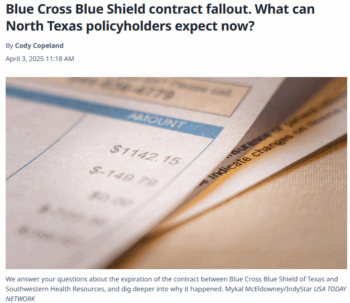
MIT economist Jonathan Gruber told the Fort Worth Star-Telegram (4/3/25) that insurer/provider conflicts illustrate why “the government should step in and regulate prices.”
The Fort Worth Star-Telegram got this right. On April 1, contracts between Southwestern Health Resources (SWHR) and Blue Cross Blue Shield of Texas (BCBSTX) expired amidst the usual anxious media coverage (e.g., Dallas Morning News, 4/1/25; WFAA, 4/2/25; KDFW Fox 4, 4/1/25).
A long Q&A-style summary in the Star-Telegram (4/3/25; non-paywall MSN text here) featured MIT economist Jonathan Gruber saying that “really the insurers and the providers are both bad guys when it comes to costs.” According to Gruber, markets have failed, and
situations like these contract negotiations breaking down are good examples of why the government should step in and regulate prices that the private sector has failed to keep within reach of the average consumer.
Gruber’s quote could well have been national news itself. Gruber was the intellectual architect of the Affordable Care Act, and it’s remarkable for an expert of his stature and influence to say categorically that markets have failed, and that government needs to regulate prices. Regardless, Gruber’s observation that market contracts between private insurers and hospitals have failed, and are likely to continue failing, is essential to understanding what’s happening when the healthcare mob wars come to your town.
As usual in mob wars, politicians bought by the combatants publicly wring their hands, while collecting millions of dollars in campaign assistance from each side and doing nothing to end the carnage. When the allegedly charitable Northeast Georgia Health System and insurer UnitedHealthcare ramped up their fear campaigns in 2023, Sen. Raphael Warnock (D–Ga.) sent strongly worded letters to both parties, typically devoid of anything indicating whether and how Senator Warnock and colleagues intend to prevent this from happening again. The dispute was a rare one that ended without an agreement.

The ultimate missing context for these stories is that for all their public antagonism, the insurance and hospital industries march in lockstep on the most important policy questions in the nation’s capital. The American Hospital Association and health insurers both spend millions of the dollars they get from premiums, and the rates exchanged under the terms of these contracts, to defeat Medicare for All, and make even modest partial reforms, like Gruber’s proposed price regulation, politically impossible.
Right-click here to download this episode (“Save link as…”).

Ruby Bridges challenged US segregation in 1960.
This week on CounterSpin: You can say someone ‘supports the rights’ of people of color to vote, or to have our experience and history recognized—as though that were a passive descriptor; she ‘supports the rights’ of people of color to be seen and heard. The website of the Kairos Democracy Project has a quote from John Lewis, reminding us: “Democracy is not a state. It is an act.”
Tanya Clay House is board chair at Kairos and a longtime advocate for the multiracial democracy that the Trump White House seeks to denounce and derail—in part by erasing the history of Black people in this country. As part of that, she’s part of an ongoing project called Freedom to Learn and its present campaign, called #HandsOffOurHistory. We hear from Tanya Clay House about that work this week.
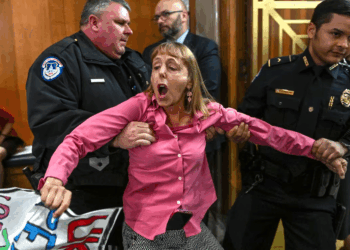
Code Pink’s Medea Benjamin
Also on the show: Corporate news media evince lofty principles about the First Amendment, but when people actually use it, the response is more telling. When USA Today covered activism in Seattle around the WTO, it reported: “Little noticed by the public, the upcoming World Trade Organization summit has energized protesters around the world.” You see how that works: If you’re the little-noticing “public,” you’re cool; but if you band together with other people and speak out, well, now you’re a “protester,” and that’s different—and marginal. Whatever they say in their Martin Luther King Day editorials, elite media’s day-to-day message is: ‘Normal people don’t protest.’ In 2025, there’s an ominous addendum: ‘Or else.’
Danaka Katovich is co-director of the feminist grassroots anti-war organization CODEPINK, currently but not for the first time at the sharp end of state efforts to silence activists and activism. We hear from her this week.
Janine Jackson interviewed Pregnancy Justice’s Karen Thompson about criminalizing pregnancy for the April 25, 2025, episode of CounterSpin. This is a lightly edited transcript.
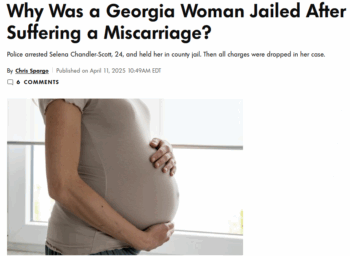
People (4/11/25)
Janine Jackson: “Why Was a Georgia Woman Jailed After Suffering a Miscarriage?” That’s the headline over an account of Selena Chandler-Scott, a 24-year-old woman who was treated by paramedics after a miscarriage on March 20 and arrested the 21st, charged with “concealing the death of another person” and “abandonment of a dead body.” Charges weren’t dropped until April 4.
And the question of the headline remains, to which I’ll add another: Why was this story in People Magazine and not, say, the New York Times?
Joining us now to talk about where this terrible story fits in the current landscape is Karen Thompson, legal director at the group Pregnancy Justice. She joins us now by phone. Welcome to CounterSpin, Karen Thompson.
Karen Thompson: Hi, thanks for having me.
JJ: There’s a single sentence in this People story that gave me chills: “Police investigated Chandler-Scott because she was 19 weeks into her pregnancy when she suffered her miscarriage.” That “because,” you know. But the DA says law enforcement “acted in good faith” by arresting her. Why is that? Why did she go to jail?
KT: She went to jail because of an idea that fetuses have legal rights. She had a miscarriage at home. She did what most doctors tell folks who are experiencing a miscarriage to do, which is to stay at home. But because she did that, and because someone saw her disposing of those remains, the EMTs and the prosecutors decided that she was engaging in a crime. And why? Because that fetal anomaly, the fact that she had that miscarriage, was enough for them to justify arresting her. And that’s the basis of pregnancy criminalization, and what we’re seeing, not only in Georgia, but all around the country.
JJ: So to be clear, this is not an aberration. It’s one of a number of cases. Listeners may have heard some of them, but I think for some people, they’re getting caught up in this “fetal remains” and the “disposal process.” But this is part of miscarrying. In other words, what are the laws that are relevant here?
KT: I think that’s a really important place to start, right? First of all, let’s just think and talk about miscarriages. They are pretty common. I believe the number is three out of five pregnancies might end in a miscarriage, and that goes to show that this isn’t something that’s abnormal. It’s not something that is unknown to individuals who are pregnant. It’s a tragedy, but it’s a tragedy that occurs quite frequently.
And so I think the saddest thing about this is that in this moment of loss, when she should have been given healthcare, and when she should have had a moment to grieve, she was instead facing a law enforcement response, a carceral response, to what is really a medical question and a health issue.
JJ: What are the laws? There are laws governing, and I guess they differ state to state, but what are important laws around—what on earth is a person to do when they miscarry at home with fetal remains?
KT: Well, it’s unfortunate, because Georgia did pass a fetal personhood law in 2019, and it has that law in its criminal code. And so what that means is that we’re still trying to figure out what prosecutions are going to be brought under that law. And even though Georgia has a specific infanticide law, that is any kind of homicide involving children, even though they have a law that exempts the conduct of a pregnant woman with respect to her unborn child, Georgia’s murder statute doesn’t have that same exception.
And so although courts before the passage of that fetal personhood law declined to recognize fetuses as people for the purposes of murder, we don’t know where we are right now. And the fact that this poor woman was charged in this way is showing us that the laws that are on the books are now being expanded, and used in this method to criminalize pregnant women.
JJ: I think they’re making use of the sort of secrecy and shame with which miscarriage can be surrounded. The very fact that people might not understand what happens when you miscarry at home has to do with silences around it.
And I want to point out the fact that Pregnancy Justice has a resource called Unpacking Fetal Personhood that really talks you through these laws—where they come from, what they do and what they mean. And I would direct folks to that resource.
As we record on April 24, I did do another search this morning. I still saw nothing from broadcast news, major dailies. And now it’s been a month in the past, so is it even “news’ anymore? I don’t know if these major outlets think that they have met their quota of reporting on efforts to control pregnant people, but what do you make of media attention in general to these laws, to their predicted and predictable impacts? How do you think journalists are doing on this?
KT: I don’t think they’re doing great, to be honest, for the reasons that you said. I think that there are a lot of ways in which the attention is pulled to what is being framed as a crime. But what is not happening is the understanding that even this terrific news, which did get reported on, that the charges were dropped against Ms. Chandler-Scott, the bigger problem is that it doesn’t undo the very real harm and devastation that the charges bring in the first place.
And what the media are doing by not reporting on the charges being brought, instead of the fact that they were dropped after pressure was brought to bear by the community, by the outrage of huge swaths of the United States population, that is the stuff that gets things going. But, unfortunately, it is the stuff that is always ignored by the media.
And that’s not just within the reproductive justice space. We’ve seen it when it comes to racial equity, economic equity. There are places that fall out of the conversation because the issues that they foreground, the issues that they shine light on, are really hard for people to accept.
And so my hope is that even in this really calamitous situation, Ms. Chandler-Scott is getting rest and privacy, but what it’s showing us is that we have to continue to talk about these cases. We have to continue to talk about what’s happening, and we have to hold space for women who are going through something that a lot of other women have experienced. We need to make sure that they are not feeling shame, that they know that they did not do anything wrong, and they deserve to get the medical help and the support that they need.
JJ: I was struck by a number of stories, of what stories there were, they would end with, “We reached out to Ms. Chandler-Scott, and we haven’t heard back.” And I thought, “You think? You think maybe she doesn’t want to chat right now?” And what I wonder is, why not reach out to the police? Why not reach out to the DA and ask them why they did what they did, and demand answers from them, rather than trying to add human interest or color to the story by talking to someone who doesn’t have any reason to necessarily talk to you?
KT: Right.
JJ: Well, that’s my rant.
And I’m just going to ask you, finally: Pregnancy Justice. It’s not just abortion rights; that’s part of it. Pregnancy justice is a more expansive term and concept, that’s not about separating out cases from one another. I’d just like to give you an opportunity, finally, to talk about what that broader understanding means. And then, are there particular policies and laws that you point to, that could meaningfully intervene right now? Just final thoughts.
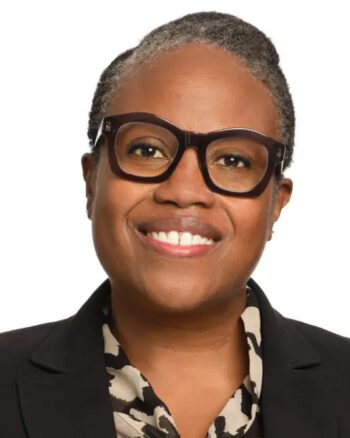
Karen Thompson: “The thing that is important to know about pregnancy criminalization is that it doesn’t stay still.”
KT: Pregnancy Justice, our entire mission is to advocate for those who are being criminalized because of their pregnancies, their pregnancy outcomes, like a miscarriage in this case, or stillbirth or abortion. But, as you noted, abortion cases are actually a tiny fraction of what we see, and, sadly, the vast majority of them involve people who are criminalized for behavior during their pregnancy that people don’t approve of, whether that’s substance use, or maybe not even getting prenatal care in a way that others would like folks to do.
And so the thing that is important to know about pregnancy criminalization is that it doesn’t stay still. The laws that are being used to criminalize folks, as they were used here in the Chandler-Scott case, they’re not made, actually, to protect a child, but they’re being used against pregnant people in a way that is just harmful to pregnant people, and not actually helping or serving their pregnancies, or the fetus that the state is saying that they have interest to protect.
So our work is to make sure that the truth about science, and the reality of giving rights and not stripping them from pregnant people, upholding bodily autonomy for folks who are experiencing pregnancy—all of those things are our focus, so that we can make sure that the law is doing what it’s supposed to do, and not spreading to just criminalize pregnant people, and socially control how they act and the decisions they make with their bodies.
And, unfortunately, we’re up against a lot of laws, a lot of legislative pushes to make abortion a homicide, to say that any exposure in utero that might involve drugs, whether prescribed or not, is sufficient to charge somebody with murder if they have an adverse pregnancy outcome. All of these laws are percolating in at least 17 different states in the country.
So my hope is that people will stay aware, that they will look at the resources, including the one that you just mentioned, on our website, and that we can start thinking about the ways in which what is happening now reflects a broader picture of trying to keep women out of public space, from having power over their own bodies to make their own decisions, and to understand where that fits into a bigger picture around criminal justice and incarceration in this country.
JJ: All right then. We’ve been speaking with Karen Thompson, legal director at Pregnancy Justice. They’re online at PregnancyJusticeUS.org. Thank you so much, Karen Thompson, for joining us this week on CounterSpin.
KT: Thanks so much for having me, and having this discussion.